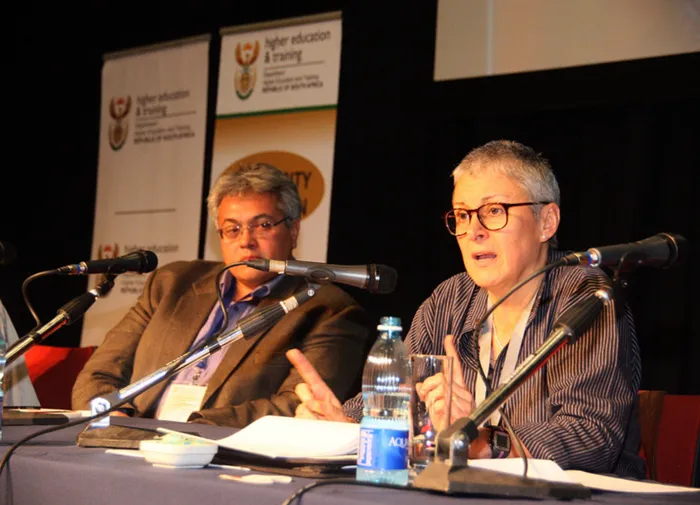
Professor Seeraj Mohamed, left, associate professor of economics at the University of the Western Cape, in discussion with Liz Lange, Wits vice-rector, about curriculum transformation in higher education. Picture: SANDILE MAKHOBA Professor Seeraj Mohamed, left, associate professor of economics at the University of the Western Cape, in discussion with Liz Lange, Wits vice-rector, about curriculum transformation in higher education. Picture: SANDILE MAKHOBA
Whether tertiary institutions are responsive to skills needed in the South African workplace, and whether the Western-based education curriculum and learning material were appropriate for Africa, were among critical questions discussed by academics on Friday.
The discussion took place during a knowledge and curriculum transformation session at the Second National Higher Education Transformation Summit.
Academics were in broad agreement that changes to the curriculum were needed.
Panelist Professor Seeraj Mohamed, associate professor of economics at the University of the Western Cape, said after the debate that there were two schools of thought in the arena of curriculum reform.
“There are some people who say that the present curriculum at tertiary institutions is not responsive enough to the needs of business and the marketplace.
“And then you have people who say that it’s not the role of tertiary institutions to prepare critical thinkers, that students are there to learn.”
“On top of this you have the issue of identity and what it means to be African,” he said.
While the transformation summit was one way to address the issues, more debate was needed between people with differing opinions.
“As an example, I teach economics and the field is dominated by the teaching of neoclassical economics. The textbooks are mainly from America. However, while this is seen as the main form of teaching the subject, there are alternative theories that can be taught, such as those that have relevance for an African or South African situation.”
More critical thinking needed to be encouraged, but often the way things were done at universities did not support this, he warned.
“Undergraduate teaching is mostly outstaffed. In the US they have contract teachers, so to speak, and this is happening here in South Africa. You have doctorate students teaching first-year students. This can create challenges as the lecturer easily downloads presentations off the internet, (and) often these are based on Western literature.
“They are led to believe that there is only one way of viewing things, and no one encourages them to look at different ways when the mainstream way of doing things is easily accessible.”
Mohamed said he believed in looking at the orthodox ways, but also in teaching the heterodox ways.
Saturday Argus
* E-mail your opinion to IOLletters@inl.co.za and we will consider it for publication or use our Facebook and Twitter pages to comment on our stories. See links below.
@IOL on Twitter
IOL News on Facebook
